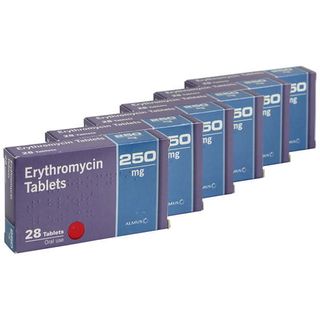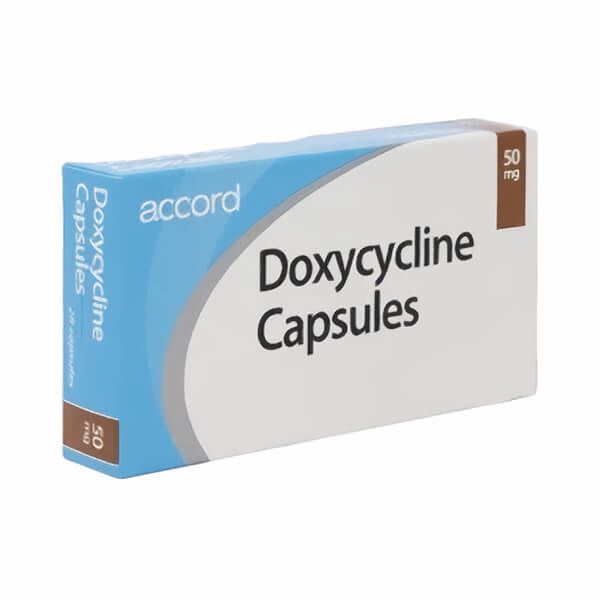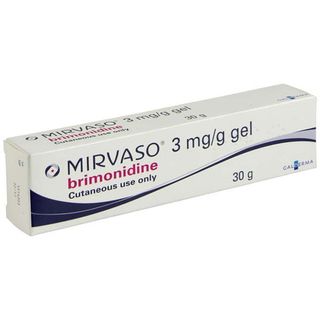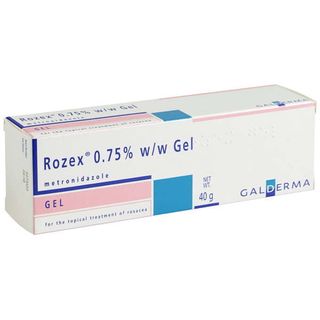

Doxycycline For Rosacea
- Free standard delivery on orders over £40Spend £40.00 more for free delivery
- Fast, discreet delivery
Delivered in secure, plain packaging on fully tracked delivery from just £2.95
- 100% UK-based pharmacy
Our team of doctors and pharmacists, and our support staff, are all UK-based.
- Free advice and support
Have a question? Telephone support is always free; Monday - Friday, 9am - 5pm.
- We're rated 4.9 out of 5
Based on over 24,000 reviews collected on Google and Reviews.io.
We maintain the highest possible regulation for a UK online pharmacy, ensuring your experience is safe, and confidential.
Doxycycline For Rosacea
Doxycycline is a powerful, prescription-only medication commonly used to treat rosacea, a skin condition that causes redness, inflammation, and visible blood vessels on the face.
When prescribing Doxycycline for Rosacea, most doctors or pharmacists will recommend a treatment course of between 6-12 weeks, though this can vary from patient to patient. Tired of suffering through unpleasant, inflammatory rosacea symptoms? A brief online consultation is all it takes to order Doxycycline through The Independent Pharmacy.
This treatment requires an online consultation for review by our medical team. The decision to supply the specific treatment and quantity requested will be based on whether our medical team are satisfied that it will be safe, appropriate, and effective.
Doxycycline For Rosacea summary
- Type of medicine
- Tetracycline antibiotics
- Works by
- Kills the bacteria that causes rosacea
- Active ingredient
- Doxycycline hyclate
- Strength
- 100mg (2 x 50mg)
- Effective within
- Up to 12 weeks
- Pack size
- 56 capsules
- Generic
- Yes
- Use with alcohol
- In moderation
What is Doxycycline?
Doxycycline is a prescription-only medicine belonging to a group of oral antibiotics known as tetracyclines. Tetracyclines are among the most commonly-prescribed and effective medicines for rosacea patients, and alongside rosacea, Doxycycline can be used to treat a variety of infections, including chlamydia and acne.
It is crucial to follow your doctor's instructions when taking Doxycycline. Always finish the whole course of medication, even if your rosacea symptoms subside before then — this will prevent antibiotic resistance.
Is Doxycycline good for rosacea?
Rosacea is a chronic (lifelong) skin condition that mainly affects the face; particularly the cheeks and nose. The most noticeable symptoms of rosacea are redness, inflammation, and intense flushing of the cheeks.
Rosacea can present differently depending on the type. The four main types of rosacea are:
- Erythematotelangiectatic rosacea, which is characterised by flushing, redness of the skin, and visible blood vessels.
- Papulopustular rosacea, which causes inflammatory lesions (papules and pustules) similar to acne, with red and swollen skin.
- Phymatous rosacea, which thickens the skin and gives it a bumpy texture.
- Ocular rosacea, which affects the skin around the eyes, causing swollen eyelids, sty-like lumps, and red and irritated eyes.
While medical science is still yet to discover a cure for rosacea, oral tetracyclines (the family of drugs to which Doxycycline belongs) have the strongest evidence for providing symptomatic relief from rosacea. Doxycycline is generally accepted as one of the best ways to manage these unpleasant symptoms.
Doxycycline is suitable for people who have already tried topical therapy options (such as topical Metronidazole (Rozex Gel), topical Ivermectin (Soolantra Cream), and Azelaic Acid) but found them to be ineffective.
For more information, visit the Rosacea treatments hub.
How Doxycycline works for rosacea
Doxycycline treats rosacea by killing the bacteria that build up inside clogged pores. However, rosacea responds slowly to antibiotics, which means that a long-term course of treatment is required — typically this course of treatment lasts a couple of months.
If you’re prescribed Doxycycline as an antibiotic therapy for rosacea, it’s crucial that you take every dose as prescribed and complete the whole course of treatment, even if your symptoms have already cleared up. This will prevent any future bugs from developing bacterial resistance against Doxycycline.
Sources
Doxycycline: Patient Information Leaflet
How should I take Doxycycline for rosacea?
At The Independent Pharmacy, for Rosacea we offer Doxycycline 50mg Capsules.
For the treatment of Rosacea, two 50mg capsules are to be taken once daily.
Generally, treatment will go on for around 6-12 weeks.
Doxycycline ingredients
Each Doxycycline capsule contains 50mg Doxycycline (as hyclate) as the active ingredient.
Each capsule also contains: gelatin, magnesium stearate, shellac glaze, sodium lauryl sulphate, starch, E104, E127, E131, E171, E172 & propylene glycol.
Doxycycline side effects
Common side effects (affecting around 1 in 10 people) include:
- Nausea
- Vomiting
- Headaches
- Sun sensitivity
Stop taking your treatment and see your doctor immediately if you experience any of the following symptoms that may indicate an allergic reaction:
- Wheezing/difficulty breathing
- Fever
- Swelling of the face, lips, throat, tongue, hands or feet
- Increased heart rate
- Low blood pressure
- A rash
- Itching
- Diarrhoea
- Cramps
If you experience severe or persistent side effects, it's important to contact your healthcare provider. For a full list of side effects and information about taking Doxycycline, including interactions with other medication, see the Patient Information Leaflet.
What happens if I overdose on Doxycycline?
An overdose of Doxycycline can be dangerous and may cause severe side effects. If you suspect an overdose, seek medical help right away. The symptoms of an overdose may include:
- Nausea and vomiting
- Diarrhoea
- Loss of appetite
- Abdominal pain
- Dizziness
- Headache
- Drowsiness
- Blurred vision
In severe cases, an overdose may lead to more serious side effects such as:
- Seizures
- Coma
- Kidney damage
- Liver damage
Overdosing on Doxycycline is not known to be fatal when taken alone. However, an overdose of any medication should be considered a medical emergency and treated immediately.
Doxycycline warnings
Before deciding to use Doxycycline, you should consider the following warnings.
Do not take Doxycycline if:
- You have ever had an allergic reaction to any of the ingredients listed below.
- You are in or have passed the fourth month of pregnancy, as it may affect the unborn baby. If you become pregnant whilst taking Doxycycline, consult with your doctor as soon as possible.
- You are currently using any oral retinoids.
- You suffer from achlorhydria (an absence of stomach acid) or have had any surgery on the duodenum (upper part of the gut).
You should always consult with your doctor before beginning a course of Doxycycline if you:
- Have liver disease.
- Are predisposed to candidiasis overgrowth.
- Are currently suffering from an oral or vaginal fungal or yeast infection.
- Currently suffer from a muscle disease.
- Currently suffer from colitis.
- Experience any oesophageal ulceration or irritation.
- Have rosacea affecting the eyes.
- Frequently expose yourself to strong UV light, as sunburn can occur more easily.
What medications should I avoid when taking Doxycycline to treat rosacea?
There are several medications that you should avoid taking while taking Doxycycline. These include:
- Blood thinners: Doxycycline may increase the risk of bleeding when taken with blood thinning medications such as warfarin (Coumadin) or aspirin.
- Retinoids: Doxycycline may increase the risk of skin irritation when taken with retinoids such as isotretinoin (Accutane).
- Oral contraceptives: Doxycycline can make the contraceptive pill less effective.
- Any medication containing calcium, aluminium, magnesium, or iron, such as antacids.
- Antibiotics containing penicillin.
Please refer to the Patient Information Leaflet for a full list of warnings. Always inform your doctor or pharmacist of any medications you are currently taking before starting Doxycycline.
What happens if I miss a dose of Doxycycline?
If you miss a dose of Doxycycline, it is important to take it as soon as you remember. However, if it’s almost time for your next scheduled dose, it’s better to skip the missed dose and continue with your regular dosing schedule. Do not take extra medicine to make up for the missed dose.
Missing doses can decrease the effectiveness of the medication and may prolong your recovery time. If you miss multiple doses, it’s best to inform your GP or pharmacist as soon as possible.
Always complete the entire course of antibiotics as prescribed, even if you start to feel better. This helps to ensure that the infection is completely cured and reduces the risk of resistance.
Related Treatments
 Erythromycin 250mg Tablets£21.4956 reviews
Erythromycin 250mg Tablets£21.4956 reviews
Mirvaso Gel
Mirvaso Gel£52.0010 reviews- Out Of Stock

Rozex Gel
Rozex (Metronidazole) 0.75% Gel98 reviews
Visit our Doxycycline For Rosacea page for treatments, advice and FAQs.
Ordering as easy as 1, 2, 3
1. Find the ideal treatment
We can provide over 1099 leading medicines to treat over 94 conditions.
2. Get a free consultation
Our qualified healthcare professionals will assess your condition and needs.
3. Enjoy speedy delivery
And when the time comes to re-order, it'll only take a couple of clicks.